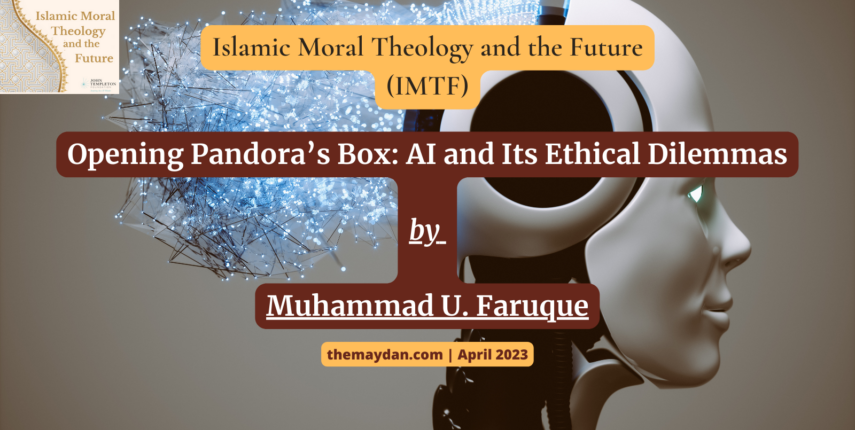
Opening Pandora’s Box: AI and Its Ethical Dilemmas
Imagine what it would feel like to have AI as your best friend within the next few years. This is what Jim Keller, a former Apple employee and a Silicon Valley guru, predicts.[1] And perhaps one should take such prognostication seriously, especially in light of the emergence of ChatGPT and the hysteria (do a quick google search, and you will find numerous news articles, blogs, discussion threads, etc.) around it. ChatGPT is a machine-learning system that autonomously learns from data and can produce seemingly intelligent writings and conversations after training on a massive data set available on the net. It would not be an understatement to suggest that it approximates Alan Turing’s dream of creating an intelligent machine, which would interact with human beings in such a way that they will not be able to discern whether they are conversing with a machine or a human being.[2]
Be that as it may, underlying all the excitement surrounding ChatGPT are the deeper questions of the overall impact of technology on education, research, inequality, and what it means to be human in an era of AI.[3]
Many argue that AI helps to widen the productivity gap, which has far-reaching consequences on economic inequality.
Take, for instance, the case of “inequality.” Many argue that AI helps to widen the productivity gap, which has far-reaching consequences on economic inequality. As Erik Brynjolfsson argues, with more and more human-like AI, machines become better substitutes for human labor, and workers loose economic and political bargaining power and become increasingly dependent on those who control the technology.[4] Similarly, Acemoglu and Restrepo provide compelling evidence on how developments in AI have led to the worsening of inequality in the US. In their calculations, 50 to 70% of the growth in US wage inequality between 1980 and 2016 was caused by forms of automation.[5] Others such as Anton Korinek predict the negative effect on labor market as a result of the tens of billions of dollars that have gone into building autonomous cars, since these vehicles will take the jobs of countless drivers.[6]
But there seems to be even more structural issues with recent advancements in AI-fueled technologies. In his recent book The Algorithmic Leader, Mike Walsh explores one particularly dire scenario in which he observes a growing class-based divide between the people who work for algorithms, a privileged professional class (e.g., computer scientists) who have the skills and capabilities to design and train algorithmic systems, and a small, ultrawealthy rich, who own the algorithmic platforms that run the world.[7] He gives the examples of Uber and Amazon through which a global, low-paid, algorithmic workforce is already emerging. In other words, these businesses manage their workers algorithmically through AI by subjecting them to constant monitoring and surveillance.
The result of an algorithmic workforce is job polarization, which leads to a K-shaped graph. This is a situation where the prospects of those at the top soar, while everyone else sees their fortunes plummet
The result of an algorithmic workforce is job polarization, which leads to a K-shaped graph. This is a situation where the prospects of those at the top soar, while everyone else sees their fortunes plummet. There is a “code ceiling” in a K-shaped situation that hinders career mobility and advancement. This is because in an AI-powered organization such as Uber or Amazon, low-paid employees rarely interact with other human co-workers at the top, as they are managed by algorithms.[8] It is thus not unreasonable to think that AI helps to concentrate wealth and power in the hands of the few, thereby exacerbating economic inequality. This is true even at the global level. A recent study by the IMF staff finds that AI-powered technology risks widening the gap between rich and poor countries by shifting more investment to advanced economies where automation has an established infrastructure. This could in turn have negative consequences for employment in developing economies by threatening to replace rather than support their growing labor force, which has traditionally provided an advantage to less developed economies.[9] In short, AI empowers capital but destroys labor. And it inevitably favors high-skilled workers while making life ever more difficult for the average worker.[10]
Yet threats associated with AI are not confined to the problem of economic inequality alone. They lead to a more sinister crisis, which I call “metaphysical inequality.” Unlike economic inequality, metaphysical inequality pertains to the human ontology in which there is now an ever-widening gap between one’s ordinary and real self due to the corrosive influence of AI.
In Islamic thinking, the ordinary self (nafs) is comprised of human intelligence, behavioral inclinations, tendencies, drives, instincts, and impulses.[11]
In Islamic thinking, the ordinary self (nafs) is comprised of human intelligence, behavioral inclinations, tendencies, drives, instincts, and impulses.[11] It also represents human vulnerability to temptations and irrational thinking. In contrast, the real self is often understood in terms of the Qur’anic term “fiṭrah,” which means one’s pristine, unadulterated nature. More accurately, fiṭrah connotes one’s innate, God-given personality, which conforms to tawḥīd or the oneness of God. According to Islamic teachings, everyone is born with an imprint of the fiṭrah, even if they gradually lose sight of it due to their immersion in the day-to-day businesses of the world.
Now in an era in which our life is increasingly organized around AI-powered technologies, people are defining themselves and their aspirations in terms of the achievements of machines, and they do not hesitate to degrade and downgrade their own intelligence vis-à-vis AI. You can often hear compliments such as “Your brain works like a computer,” even though we are its creator. In this way, human intelligence is reduced to its computational functions, despite the fact that a full spectrum of the self must include reason, intuition, understanding, wisdom, moral conscience, and aesthetic judgment, in addition to computation. But in an AI-dominated world, intelligence now implies only the analytic function of computation. Hence, for the AI folks, there is no fundamental difference between “natural intelligence” and “artificial intelligence.” In essence, they reduce human beings to computers and algorithms.
It is thus not difficult to see how AI can cause metaphysical inequality by alienating ourselves from our fiṭrah, since there is no room to accommodate notions such as wisdom or spiritual perfection.
It is thus not difficult to see how AI can cause metaphysical inequality by alienating ourselves from our fiṭrah, since there is no room to accommodate notions such as wisdom or spiritual perfection. But it is also important to recognize the limits of AI on this front, as it can never hope to replicate our fiṭrah or true humanity, which is ultimately founded upon God’s own fiṭrah, as a verse in the Qur’an affirms (Q 30:30).[12] This is very important to emphasize, as some people are bent on materializing Turing’s dream of creating a “thinking machine.” From an Islamic point of view, such attempts to replicate the fiṭrah would be like trying to replicate divine nature, which is well-nigh impossible.
Therefore, if the Qur’anic view of human nature is correct, AI can only mimic a restricted segment of the human self, namely its computational intelligence. When AI enthusiasts talk of creating a human-like AI, they already begin with the assumption that human beings are nothing but biological machines. The ethical implications of such views can hardly be underestimated, as they degrade human beings to mere animals with instincts and desires but devoid of spiritual aspirations.
...if the Qur’anic view of human nature is correct, AI can only mimic a restricted segment of the human self, namely its computational intelligence.
What is truly astonishing in all this is that AI researchers who are responsible for building AI seem to be utterly indifferent to the ethical implications of their inventions. When pressed about the ethical dilemmas surrounding AI, they will often say: “Our job is to make a machine that is like a human. Period.”[13] This is like using our best science and mathematics to open Pandora’s box but then refusing to take responsibility for what is being unleashed from it. Instead, one often hears AI gurus constantly touting simplistic notions, such as the belief that technology will solve all of the world’s great problems including climate change. What human intelligence cannot figure out, AI-laden technology can. It can end disease and poverty. It can lead to unlimited freedom, progress, and so on.
But truth be told, AI distorts our perception of reality—it makes issues such as the climate crisis worse by removing us even further from the bosom of nature with dreams of creating a virtual world. It perpetuates a mechanistic view of nature and the human being. Moreover, like all technologies, AI limits nature and humans to functional use or what Heidegger calls enframing (Gestell).
But truth be told, AI distorts our perception of reality—it makes issues such as the climate crisis worse by removing us even further from the bosom of nature with dreams of creating a virtual world. It perpetuates a mechanistic view of nature and the human being.
So, what we need urgently are global watchdog organizations along the lines of IPCC (The Intergovernmental Panel on Climate Change), which should be comprised of scientists, philosophers, economists, and sociologists. This is no small matter. Yoshua Bengio, a leading computer scientist, has already compared threats associated with AI to nuclear weapons, while many young people today seem to be in the grip of a nihilistic outlook, fearing that AI will soon make human life obsolete.[14] We need more regulations and controlled use of technology. Above all, we need to promote humanistic education to make people aware about the real meaning of being a human and what we can achieve as spiritual-metaphysical beings made in the fiṭrah of God.
Muhammad U. Faruque is Inayat Malik Assistant Professor and a Taft Center Fellow at the University of Cincinnati. He earned his PhD (with distinction) from the University of California, Berkeley, and served as Exchange Scholar at Harvard University and as George Ames Postdoctoral Fellow at Fordham University. His highly acclaimed book Sculpting the Self (University of Michigan Press, 2021) addresses “what it means to be human” in a secular, post-Enlightenment world by exploring notions of selfhood and subjectivity in Islamic and non-Islamic literatures, including modern philosophy and neuroscience. Dr. Faruque is the author of three books and over forty academic articles, which have appeared (or are forthcoming) in numerous peer-reviewed journals such as Philosophy East and West, Arabic Sciences and Philosophy (Cambridge), Brill Journal of Sufi Studies, Religious Studies (Cambridge), Brill Journal of Islamic Ethics, and Ancient Philosophy. He has delivered lectures in many North American, European, Asian, and Middle Eastern universities. He gives public lectures on a wide range of topics such as climate change, AI, subjectivity, and meditation. He is also a recipient of numerous awards, grants, and fellowships, including the prestigious Templeton Foundation Global Philosophy of Religion grant and the Title IV Grant, U.S. Dept. of Education.
[1] “AI: The Beast or Jerusalem?” | Jonathan Pageau & Jim Keller | EP 308, available at https://www.youtube.com/watch?v=0ll5c50MrPs&t=1217s (accessed on 2/18/2023).
[2] See Alan Turing’s classic paper, “Computing Machinery and Intelligence,” Mind 49 (1950): 433–460. For some relevant debates, see Muhammad Faruque, “AI versus Human Consciousness: A Future with Machines as Our Masters?” Renovatio, Spring (2023), available at https://renovatio.zaytuna.edu/article/ai-versus-human-consciousness (accessed on 2/18/2023).
[3] I am not denying that one can reap many benefits from AI. For example, it can optimize academic training by providing feedback to improve student writing and reasoning skills. It can also help to summarize literature, improve scientific papers, and write computer codes. For more information, see van Dis et al., “ChatGPT: Five Priorities for Research,” Nature 614 (2023): 224–226. Also, I am using the word “AI” in a very general sense in this essay. For a more technical definition, see Faruque, “AI versus Human Consciousness.”
[4] Erik Brynjolfsson, “The Turing Trap: The Promise & Peril of Human-Like Artificial Intelligence,” Daedalus 151.2 (2022): 272–287.
[5] Daron Acemoglu and Pascual Restrepo, “Tasks, Automation, and the Rise in U.S. Wage Inequality,” Econometrica, Econometric Society 90.5 (2022): 1973–2016. The results from such studies must be treated with caution, as there are other factors such as market power that may also affect inequality.
[6] David Rotman, “How to Solve AI’s Inequality Problem,” MIT Technology Review, April 19, 2022, at https://www.technologyreview.com/2022/04/19/1049378/ai-inequality-problem/ (accessed on 2/18/2023).
[7] Mike Walsh, “Algorithms are Making Economic Inequality Worse,” Harvard Business Review, Oct. 22, 2020, at https://hbr.org/2020/10/algorithms-are-making-economic-inequality worse#:~:text=AI%2Dpowered%20organizations%20are%20being,millions%20of%20low%2Dpaid%20workers.&text=The%20risks%20of%20algorithmic%20discrimination,and%20scrutiny%2C%20and%20rightly%20so (accessed on 2/18/2023).
[8] Walsh, “Algorithms.”
[9] Alonso et al., “How Artificial Intelligence Could Widen the Gap Between Rich and Poor Nations,” IMF Blog, Dec. 2, 2022, at https://www.imf.org/en/Blogs/Articles/2020/12/02/blog-how-artificial-intelligence-could-widen-the-gap-between-rich-and-poor-nations (accessed on 2/18/2023).
[10] For some counter arguments on AI and inequality, see Littman et al. “Gathering Strength, Gathering Storms: The One Hundred Year Study on Artificial Intelligence,” Doc: http://ai100.stanford.edu/2021-report.
[11] For a full-scale study of the self in Islamic thought, see Muhammad Faruque, Sculpting the Self: Islam, Selfhood, and Human Flourishing (Ann Arbor, MI: University of Michigan Press, 2021).
[12] The nature of God upon which He created human beings (trans. mine).
[13] Rotman, “How to Solve.”
[14] “In the Age of AI” | FRONTLINE, available at https://www.youtube.com/watch?v=5dZ_lvDgevk&t=3688s (accessed on 2/18/2023).





